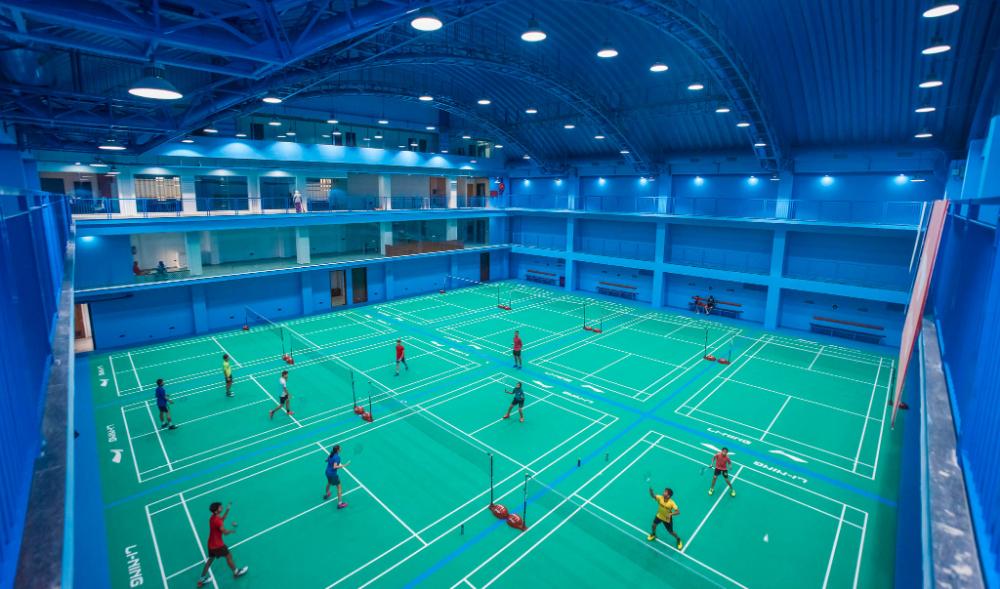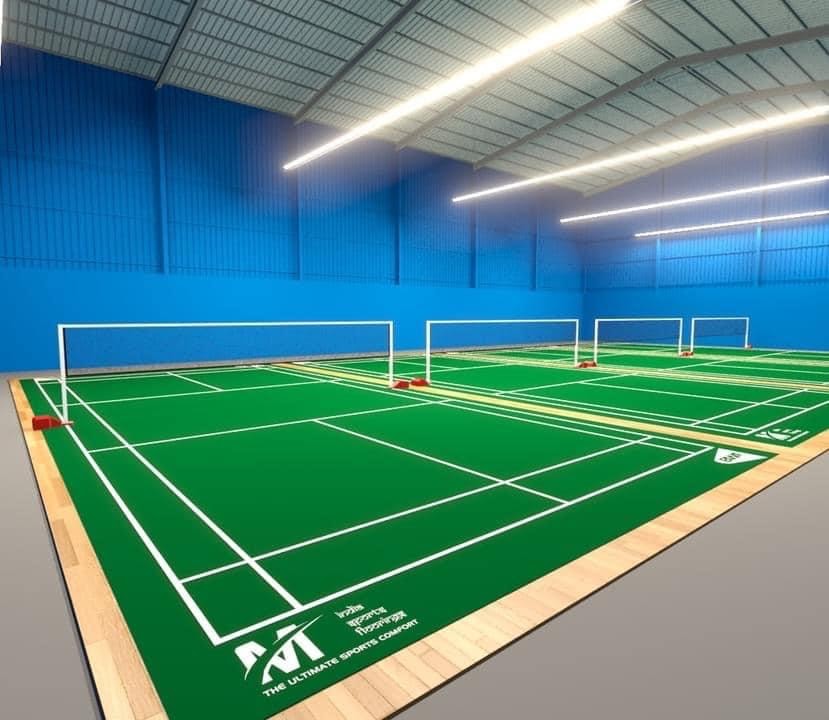
Introduction:
The flooring of a badminton court plays a vital role in determining the performance and safety of the players. Whether you are building a new court or renovating an existing one, selecting the right flooring material is crucial. With an abundance of choices in the market, deciding on the perfect one can be quite daunting. However, fear not! In this comprehensive guide, India Sports Floorings will help you navigate through the different types of badminton court flooring, their pros and cons, and factors to consider to make an informed decision.
Choosing the Right Flooring for Your Badminton Court – India Sports Floorings
Synthetic Flooring: Rubber and Vinyl
Synthetic flooring options like rubber and vinyl are popular choices for badminton courts. They offer excellent shock absorption, ensuring reduced impact on players’ joints and muscles. The smooth surface provides optimal traction and allows players to move swiftly across the court. Additionally, these materials are low-maintenance, making them cost-effective choices for long-term use.
Wooden Flooring
Wooden flooring exudes a classic and elegant appeal, making it a favorite among players and spectators alike. It offers good shock absorption and provides a consistent playing surface. However, wooden flooring requires regular maintenance and is susceptible to damage from humidity and moisture. Proper sealing and finishing are necessary to ensure its durability.
Concrete Flooring
Concrete flooring is a budget-friendly option that provides a solid and stable surface for badminton courts. It boasts remarkable durability while demanding minimal upkeep. However, concrete surfaces can be hard on players’ joints and may lead to higher chances of injuries. Adding a synthetic overlay or rubber padding can address this issue.
Acrylic Flooring
Acrylic flooring is a popular choice for outdoor badminton courts. It offers good traction and is resistant to weather conditions, making it suitable for open-air setups. Acrylic surfaces are durable and easy to clean, but they may require periodic resealing to maintain their performance.
Polyurethane Flooring
Polyurethane flooring is known for its exceptional shock absorption properties, reducing the strain on players during intense games. It provides a cushioned surface that enhances player comfort and prevents injuries. However, Nevertheless, the installation and maintenance expenses are comparatively higher than those of alternative flooring choices.
Hybrid Flooring
Hybrid flooring combines different materials to create a unique playing surface. For example, a combination of rubber and acrylic can offer the benefits of both materials. Hybrid flooring allows customization based on specific playing requirements but may be more expensive than individual materials.
Impact on Performance
Consider how each flooring material affects the game’s performance. Factors like ball bounce, player movement, and overall game speed vary with different surfaces. Choose a flooring type that aligns with your players’ preferences and the level of competition you anticipate.
Durability and Lifespan
Evaluate the durability and lifespan of the flooring material. High-quality synthetic materials and properly maintained wooden or acrylic floors tend to last longer and provide better value for money.
Budget Constraints
Your budget is a crucial factor in selecting the right flooring for your badminton court. Assess the initial installation cost, ongoing maintenance expenses, and potential repairs when making your decision.
Maintenance Requirements
Different flooring materials have varied maintenance needs. Consider the time and effort required to keep the court in top condition, as neglecting maintenance can affect the court’s performance and longevity.
Environmental Impact
Be mindful of the environmental impact of your chosen flooring material. Opt for eco-friendly options whenever possible to promote sustainability.
Professional Installation
Ensure that the flooring is installed by experienced professionals to guarantee a flawless and safe playing surface.
Compatibility with Accessories
Check if the chosen flooring is compatible with essential accessories like court markings, net posts, and other fixtures.
User Reviews and Recommendations
Read user reviews and seek recommendations from other badminton court owners to gain insights into the performance of different flooring materials.
Weather Resistance (Outdoor Courts)
If you plan to build an outdoor badminton court, consider the flooring’s resistance to weather conditions, especially rain and UV exposure.
Test and Trial
Whenever possible, visit other badminton courts with different flooring materials to experience the feel and performance firsthand.
Maintenance and Cleaning Products
Identify the cleaning products and procedures required for maintaining the flooring’s integrity and appearance.
Warranty and After-Sales Support
Check for warranties and after-sales support offered by the flooring manufacturer or supplier.
Impact on Health
Consider any potential health concerns associated with certain flooring materials, such as allergies or respiratory issues.
Safety Certifications
Ensure that the chosen flooring material meets safety standards and certifications for sports facilities.
Impact on Indoor Air Quality
For indoor courts, choose flooring materials that do not emit harmful chemicals, improving indoor air quality.
Enhancing Aesthetics
Select a flooring material that complements the overall aesthetics of your badminton court.
Versatility for Other Sports
If the court may be used for other sports as well, opt for a versatile flooring material that suits multiple activities.
Long-Term Investment
Consider the long-term benefits and returns of your flooring investment.
Seek Expert Advice
When in doubt, consult with flooring experts or sports facility consultants to make an informed decision.
FAQs (Frequently Asked Questions)
Q: Can I use synthetic flooring for both indoor and outdoor badminton courts?
A: Yes, synthetic flooring like rubber and vinyl is suitable for both indoor and outdoor courts, as they are weather-resistant and durable.
Q: Is wooden flooring a good choice for professional badminton courts?
A: Wooden flooring can be a good choice for professional courts, provided it is properly maintained and meets performance standards.
Q: Can concrete flooring be made more player-friendly?
A: Yes, adding a synthetic overlay or rubber padding can make concrete flooring more player-friendly by reducing its hardness and impact on joints.
Q: What is the average lifespan of acrylic flooring for outdoor courts?
A: With proper maintenance, acrylic flooring for outdoor courts can last around 5 to 10 years.
Q: Is hybrid flooring more expensive than individual materials?
A: Yes, hybrid flooring may be more expensive due to the combination of materials and customization options.
Q: Can I install the badminton court flooring myself?
A: It is recommended to hire professional installers to ensure the flooring is properly laid and meets safety standards.
Conclusion:
Selecting the right flooring for your badminton court is a decision that can significantly impact the game’s quality and player experience. India Sports Floorings has provided you with a comprehensive guide to help you make an informed and confident choice. Consider the specific needs and requirements of your badminton court, such as the level of play, budget constraints, and environmental factors. Each flooring option has its unique advantages and considerations, and it’s essential to weigh them carefully.

